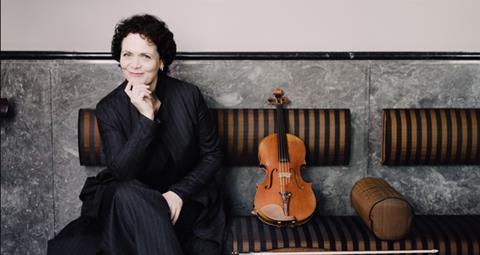Carlos Maria Solare attends the performance of Brahms, Hindemith and Sofia Gubaidulina’s at the Potsdam Nikolaisaal on 27 April 2024

The many hats that Tabea Zimmermann wore during this concert forcefully illustrated the different roles that a successful violist is expected to fulfil: recitalist, soloist with orchestra, chamber musician and orchestral player. Brahms’s Serenade no.2, which ended the concert, is scored for a violinless orchestra that nevertheless includes a full complement of woodwinds and horns. With Zimmermann in the leader’s chair, Kammerakademie Potsdam (KAP) was on its collective toes, achieving some transparent sonorities that provided a lively background for the various solo episodes.
The concert’s first half was typical of Zimmermann’s thoughtful programming. Hindemith’s unaccompanied Sonata op.25 no.1 was an effective opener, presented with generous agogic freedom while always respecting the underlying rhythms. The notorious ‘wild’ movement – a favourite Zimmermann encore – was perfectly integrated into the whole, magically segueing into the final slow movement. Zimmermann led the KAP strings with a few discreet gestures in the introduction to Hindemith’s Trauermusik, phrasing her solos as so many recitatives in a wordless cantata, the cadenzas in the concluding chorale all of a piece. (I would only take issue with her decision to play the very last phrase along with the orchestra, arguably against the piece’s dramaturgy.)
Watch: How to practise Hummel: Tabea Zimmermann’s video guide
Read: Violist Tabea Zimmermann on the pressure of competitions
The same Bach chorale is also the inspiration behind Sofia Gubaidulina’s Meditation for string quintet and harpsichord. Here Zimmermann merged into the ensemble, which convincingly realised the composer’s highly personal writing while building up a mass of sound for the piece’s climax. In between both Hindemith works, Zimmermann led the KAP’s violas in the Sinfonia from Bach’s cantata no.18, uniquely scored for four violas and continuo, soaring above them with natural yet unassuming authority.
CARLOS MARÍA SOLARE























































No comments yet